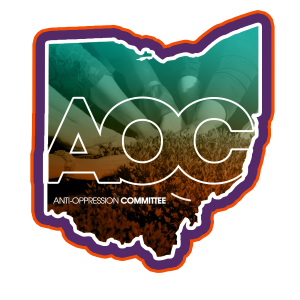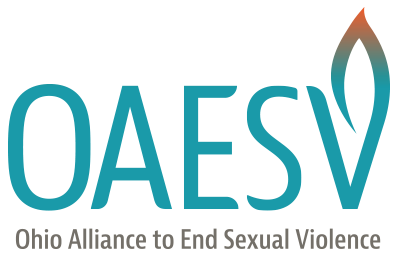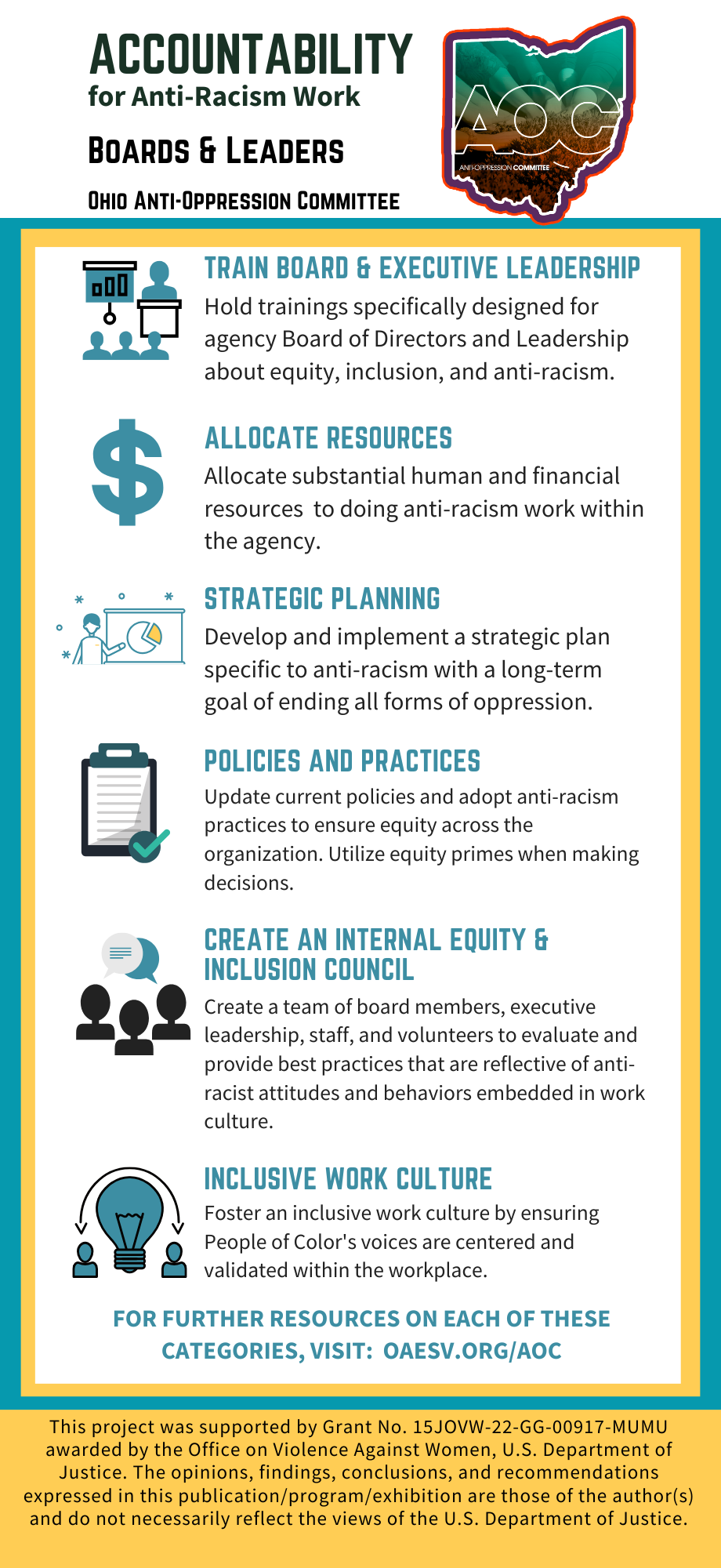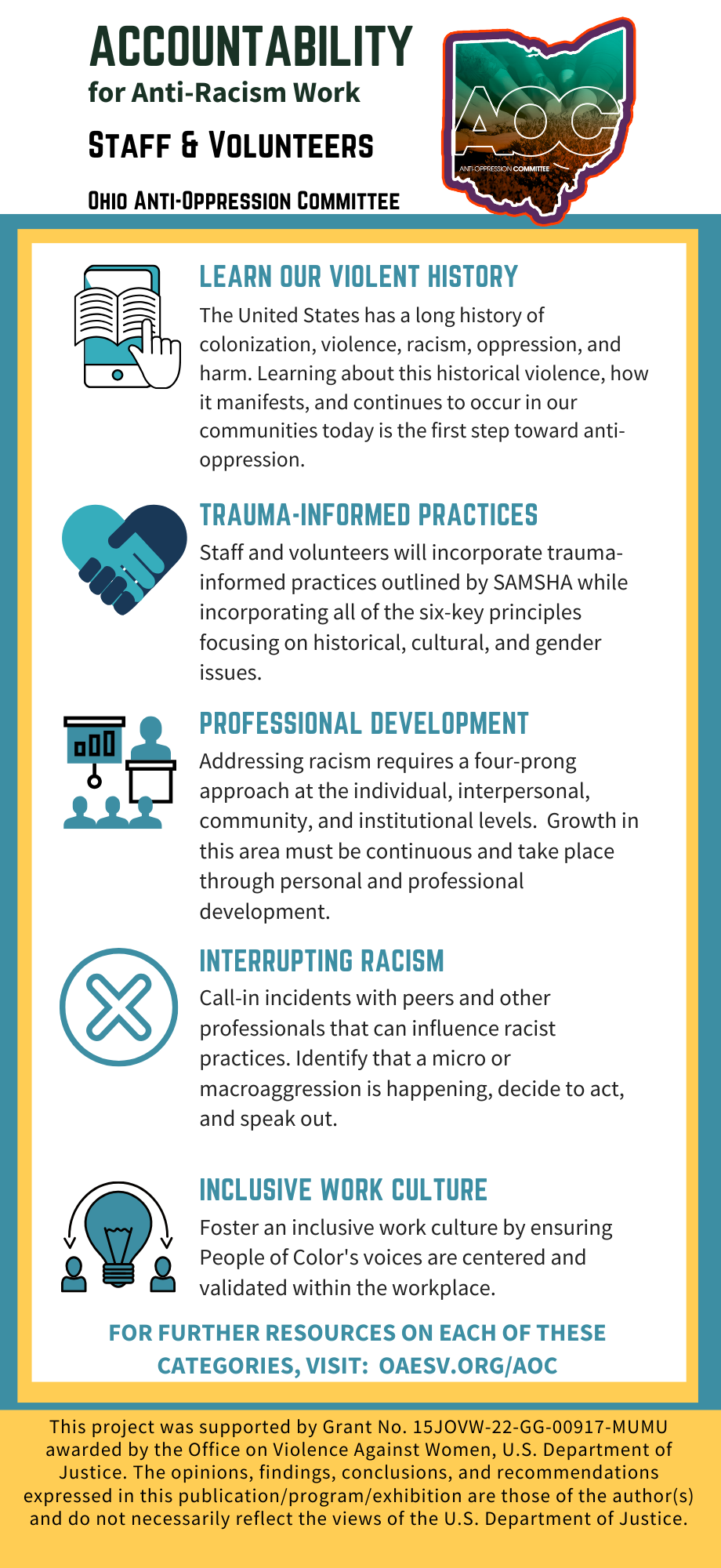
Anti-Oppression Committee
OAESV is proud to convene the statewide Anti-Oppression Committee (AOC), formed in 2014 and comprised of OAESV staff, rape crisis center staff, and allied professionals from across Ohio.
AOC Mission
The Statewide Anti-Oppression Committee advocates for leaders and people of color in anti-violence work through actively addressing individual and institutional oppression. Download our brochure HERE
Why Anti-Oppression?
People deserve a voice. In this movement, the people most affected by inequity are often excluded from the very decision-making that determines their ability to make change. Oppression occurs when economic, political, legal, and social systems increase the power of one group at the expense of another. Forms of oppression can include unfair treatment based upon: ability, age, country of origin, ethnicity, gender, gender identity, immigration status, physical abilities, mental health, race, religion, sexual orientation, and/or socioeconomic class. The AOC believes that oppressed people must be at the forefront of the movement to actualize security for all. To achieve this vision, together, we will identify and dismantle systems of oppression that disempower people and weaken our ability to individually and collectively drive change.
Our Commitment
The following anti-oppression commitments act as a guiding set of beliefs, values, and practices for our committee, our organizations, and our individual members:
- EXAMINING PRIVILEGE: Addressing the privileges we have individually and corporately to facilitate the shifting of power to those who have been historically oppressed.
- UNDERSTANDING OPPRESSION: Building competency about intersectionality and the impact of individual and institutional oppression in order to address it through our hiring processes, curricula, and proactive training.
- AMPLIFYING VOICES: Listening to and incorporating the voices of those who have been historically marginalized in our planning and decision-making.
- INCREASING ACCESS: Providing access to effective and culturally relevant resources and services for those who have been marginalized.
- REDUCING BARRIERS: Identifying and dismantling the tangible and intangible barriers that exclude and discourage those who have been historically marginalized from accessing services and developing leaders who combat oppression.
- CULTIVATING INCLUSION: Creating opportunities that welcome and reflect the diversity of people of color as leaders in the community and through a Staff and Board of Directors who reflect the diversity of our network.
Anti-oppression is life-long work that requires ongoing commitment from individuals and institutions. Therefore, this is a living document to be revised by the AOC as our understanding of anti-oppression and its role in the movement evolves.
History of the Anti-Oppression Committee
In 2013, OAESV joined the second cohort of the Women of Color Network’s National Call to Action Training and Technical Assistance Project with state sexual assault, domestic violence, tribal, and dual coalitions. The project included a commitment by OAESV board and staff to address internal policies and practices regarding the diversity and equity of staff, of rape crisis centers statewide, and of services provided to survivors. In addition to tangible changes within the coalition, the project resulted in the formation of the Anti-Oppression Committee.
Membership
Current members of the Anti-Oppression Committee (as of July 2020):
- Caitlin Burke, Director of Prevention & Public Health, OAESV
- Andrea Burton, Senior Attorney, Community Aid Society of Cleveland – Committee Chair
- Nicole Kass Colvin, Director of Coordinated Community Responses, OAESV
- Becca Getson, Director of Advocacy & Legal Services, OAESV
- Jayvon Howard, Manager of Engaging Men Initiatives, OAESV
- Jenn Eidemiller, Grants, Resources, & Communications Manager, OAESV
- Ryn Farmer, Deputy Director, Crime Victim Services – Committee Chair
- Natasha Larson, Director of Training & Member Engagement, OAESV
- Taylr Ucker-Lauderman, Chief Engagement Officer, OAESV – Committee Chair
Previous Members:
- Rosa Beltré, President & Chief Executive Officer, OAESV
- Luisa Detres-Gomez, Membership & Resource Administrator, OAESV
- Liz Poprocki, Executive Director, Ohio Victim Witness Association
- CeCe Norwood, Founder, and CEO, Nirvana Now
- Camille Crary, Former Director of Public Policy & External Affairs, OAESV
- Aaron Eckhardt, Executive Director, Buckeye Region Anti-Violence Organization (BRAVO)
- Mary O’Doherty, Executive Director, Ohio Domestic Violence Network
- Kelly Becker, Former Director of Programming, OAESV
- Olivia Montgomery, Former Social Change & Outreach Manager, OAESV; Former AOC Co-Chair
- April Carter, LAV Paralegal, OAESV
- Teresa Stafford, Chief Executive Officer, Hope & Healing Survivor Resource Center
- Sarah Ferrato, Manager of Sexual Violence Prevention & Public Health Initiatives, OAESV
- Corina Klies, Public Health Consultant, Ohio Department of Health
- Shandra Ingram, Vice President of Operations, OAESV
- Shelley Marsh, Deputy Director, Ohio Domestic Violence Network
Documents & Resources
- Anti-Oppression Committee Brochure
- Anti-Oppression and Rape Crisis Work: A Resource for Rape Crisis Centers
- Time to Speak the Truth: Statement from the AOC (2016)
- Ohio Women of Color Caucus Call to Action Statement (2014)
- Ohio Women of Color Staffing Infographic (2014)
- Women of Color Network Power & Privilege Packet
- The Time is Now: Statement from the AOC (2015)
Anti-Oppression Committee Accountability Resources
In 2020, the Ohio Anti-Oppression Committee (AOC) intentionally developed meaningful materials to help hold organizational leadership, staff, and volunteers accountable in their anti-racist policies and programming efforts. The research conducted for these materials resulted in the careful curation of two infographics and two resources designed to assist advocates and their organizations in fulfilling their commitment to anti-racism and anti-oppression. These materials are designed to actively address individual and institutional oppression of Black, Indigenous, and People of Color, including survivors and employees.
The materials align with the Ohio Anti-Oppression Committee’s commitments:
- Examining Privilege
- Understanding Oppression
- Amplifying Voices
- Increasing Access
- Reducing Barriers
- Cultivating Inclusion
The two infographics (one for Boards & Leaders and one for Staff & Volunteers) are meant to be used to motivate and energize anti-racist efforts. The companion resources provide a selection of educational and assessment resources based upon the best practices listed on the infographics. These materials can be used to start conversations, determine priorities, inspire progress, answer questions, and provide practical guidance. Regardless of the stage of change, whether personal or professional, these resources can support your participation in this very necessary work.
Anti-oppression is life-long work that requires an ongoing commitment from individuals and institutions. These resources should be considered living documents that will continue to be revised by members of the AOC as our own understanding of anti-oppression grows and our role in the movement evolves.
Contact Us
For inquiries about the Anti-Oppression Committee or training or technical assistance provided by the AOC, please contact the committee chairs: Andrea Gonzalez-Burton (agonzalezburton@lasclev.org), Ryn Farmer (rfarmer@crimevictimservices.org), and Taylr Ucker-Lauderman (tucker-lauderman@oaesv.org).
Anti-Oppression Training
An online training curriculum for rape crisis programs, domestic violence organizations, and allied organizations in understanding and cultivating anti-oppression frameworks and practices within their organizations.


